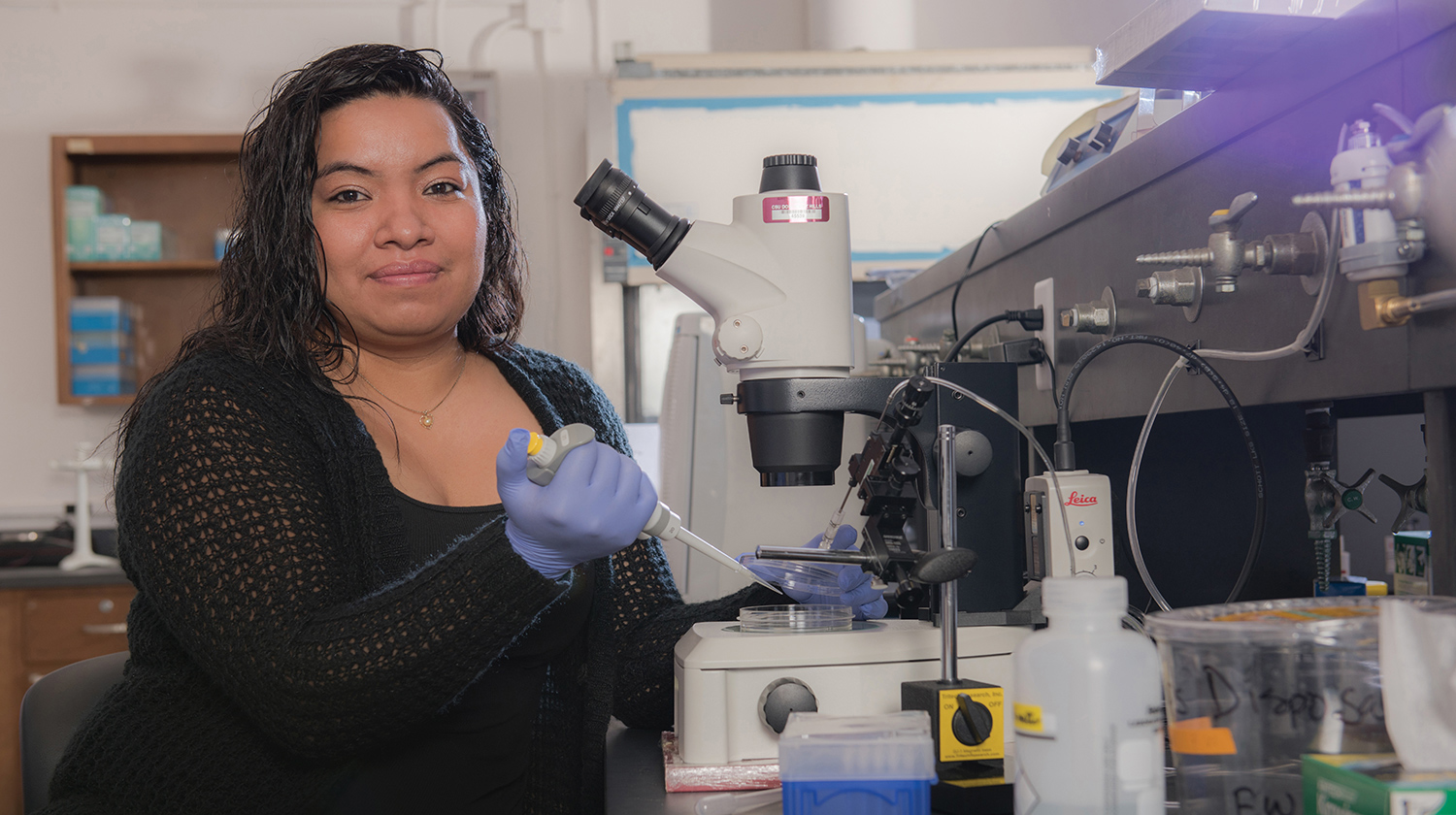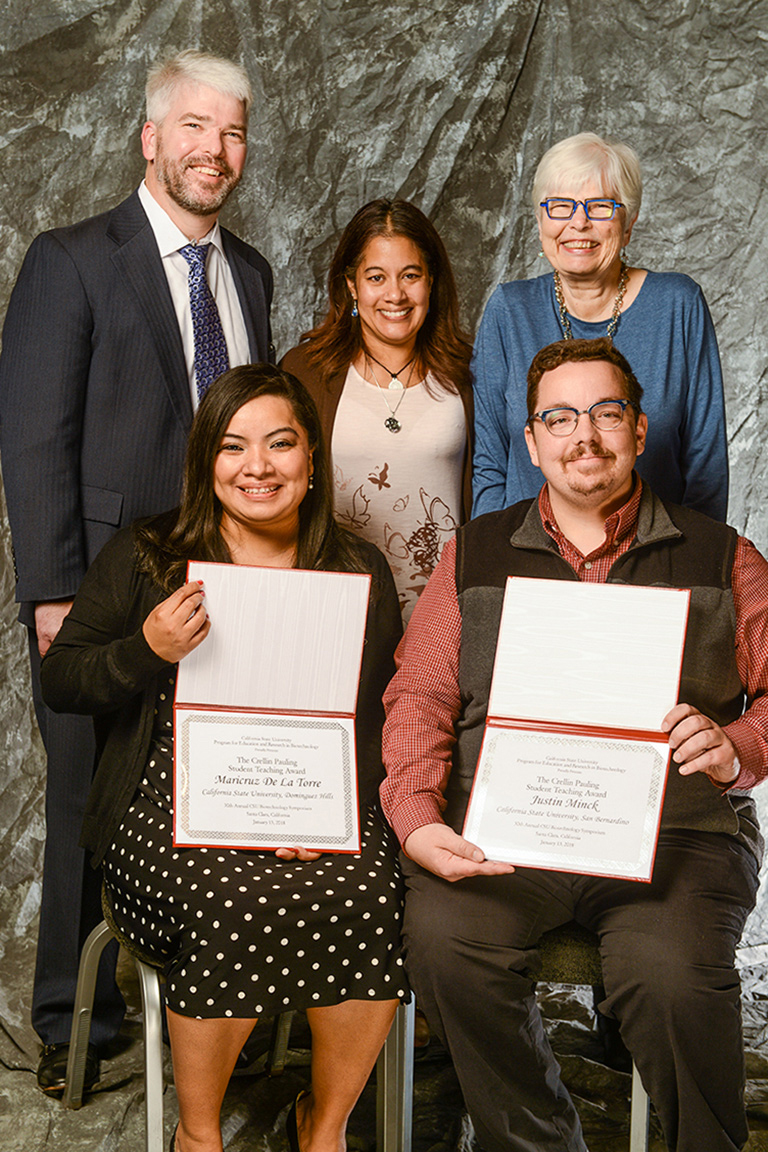
Whether she becomes a biomedical researcher, a professor, or both, California State University, Dominguez Hills (CSUDH) graduate student Maricruz De La Torre will always consider dispelling ignorant cultural views about science, and who teaches it, among her most important professional obligations.
After sharing such values in an award nomination essay, De La Torre was honored with the Crellin Pauling Student Teaching Award, and its $2,000 prize. She was one of two California State University (CSU) students given the annual award that acknowledges outstanding teaching in biotechnology-related settings, courses, and programs. The award was presented at the CSU Biotechnology Symposium on Jan. 11-13.
“I was pretty excited when I received the letter of acceptance, especially since I’m a first-generation college student and daughter of immigrant parents. I’m also a Dreamer, so the award really meant a lot to me,” said De La Torre, referring to her status in the Deferred Action for Childhood Arrivals (DACA) program. De La Torre will graduate from CSUDH in summer 2018 with her master’s degree in biology with a concentration in cellular and molecular biology.
It would be really sad and a great loss for this country if they chose to get rid of a group of people as well-educated as the Dreamers. – Maricruz De La Torre
At CSUDH, De La Torre has spent much of her time working with Assistant Professor of Biology Fang Wang on her research using Zebrafish as a way to better understand the molecular mechanisms that regulate development of touch-sensing neurons and their responses to environmental changes.
However, she received the Pauling Award for her skill in teaching non-biology majors a field of science that is often tough to grasp. Since fall 2015, De La Torre has been the instructor of CSUDH’s BIO 103 laboratory course, while serving as a supplemental instructor (SI) for molecular biology in the Toro Learning and Testing Center (TLTC). This summer, she was promoted to assistant SI coordinator, a new full-time position created to help manage the expanding SI program.
De La Torre’s essay to the Pauling nomination committee addressed in part the importance of having a scientifically literate public electorate, and shared how she overcame her learned belief that “science is a joke.”

“For me, science is a real personal experience. For many DACA students, our parents brought us to this country to go to college–to do what they were not able to do. They expected us to go into teaching, or pursue one of the more ‘popular careers,’ like being a doctor or engineer,” said De La Torre, whose parents never expected her to become a scientist. “I remember back when stem cell research was becoming mainstream. I asked my father, ‘What does that mean?’ He said, ‘Oh, scientists. They’re a joke. They receive a lot of money for research that doesn’t really do anything for society.’”
When De La Torre arrived at CSUDH she found that description of scientists and their contributions to be far from the truth, and came to the realization that such views are likely prevalent, especially among minority populations, because there is a lack of diversity within the science community.
“It’s not really their (people like her father) fault as much as it is scientists. We don’t really make science accessible to the general public, particularly Latinos, which is our number one job in my opinion,” she said. “I will always do whatever I can to conduct my work in a way that is open, accessible, and as understandable as possible for everyone.”
De La Torre is already making such an impression at CSUDH: “This young girl came up to me in the lab a few semesters ago and said, ‘You’re telling me that you’re a Mexican woman who is teaching a lab here at Cal State Dominguez Hills? I’m just not used to seeing someone I can relate to in such a position. Well, I truly am so grateful that you are my professor, and that I got to meet you because it really encourages me to realize that people like us can actually make it,'” De La Torre recalled. “Being an example and mentor to other students is what matters to me the most.”
As her graduation date nears, De La Torre finds herself at a “crossroads.”
“I initially wanted to focus on research, and at one point planned to earn a Ph.D. and run my own biomedical research firm,” she said. “However, working in the TLTC for the Supplemental Instruction program has been very rewarding, and similar work is really becoming popular nationwide. The job is making me think about going into teaching as a profession. So now I’m considering either a Ph.D., or maybe an Ed.D. [Doctor of Education].”
Whichever career path De La Torre travels, the possible cancellation of the DACA program is looming over her, as it is for many of her fellow students and staff members.
“I don’t have fear. I am a person of faith, so I strongly believe that wherever I start my career is okay. It’s all God’s plan–whether that means staying here, are going back to Mexico to work,” she said. “I have already obtained the tools that I need, and the education that my parents have provided for me to be successful. Nobody can take that away from me now, but it would be really sad and a great loss for this country if they chose to get rid of a group of people as well-educated as the Dreamers.”